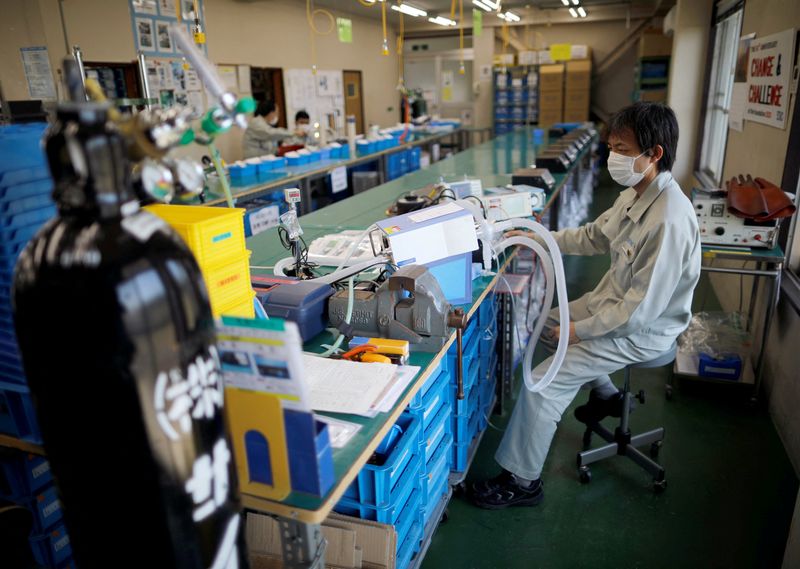BOJ tankan shows Q4 manufacturers’ mood worsens
2022.12.13 19:24

© Reuters. FILE PHOTO: Employees of Sanko Manufacturing Co. are seen at the assembly line of the company’s ventilators at a factory in Saitama, north of Tokyo, Japan May 8, 2020. Picture taken May 8, 2020. REUTERS/Issei Kato
By Leika Kihara and Tetsushi Kajimoto
TOKYO (Reuters) – Japanese manufacturers’ mood soured in the final quarter of 2022, a central bank survey showed on Wednesday, as persistent cost pressures and the prospects of slowing global demand clouded the outlook for the world’s third-largest economy.
But service-sector sentiment brightened in the October-December period, the Bank of Japan’s closely watched “tankan” survey showed, as the hit to consumption from the coronavirus pandemic faded.
The mixed outcome highlights the challenge Japanese policymakers face in prodding companies to raise wages and compensate households for the rising cost of living – a factor the BOJ sees as crucial for inflation to sustainably hit its 2% goal.
The headline index for big manufacturers’ mood fell to plus 7 in December from plus 8 in September, the tankan showed, compared with a median market forecast for a reading of plus 6. It fell for the fourth straight quarter and marked the lowest level since March 2021.
The big non-manufacturers’ confidence index rose to plus 19 from plus 14, beating market forecasts of plus 17, the survey showed.
Both big manufacturers and non-manufacturers expect business conditions to worsen three months ahead, the tankan showed.
Core consumer prices rose 3.6% in November from a year earlier, the fastest pace in 40 years and exceeding the BOJ’s 2% target for a seventh straight month, as the yen’s slump inflated the cost of importing already expensive fuel and food.
The rising cost pressure took a toll on businesses and households, which was behind the economy’s unexpected contraction of an annualised 0.8% in the third quarter.
Analysts expect growth to rebound in the current quarter due to easing supply constraints and lifting of COVID-19 border controls, though weakening global demand may cloud the outlook.








